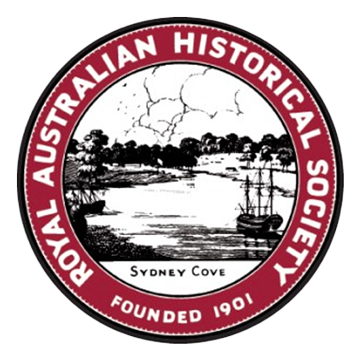Skills for ‘Doing History’
The RAHS is committed to providing educational and training opportunities to its members and the broader history community that will support history and heritage projects. Below you will find a selection of handouts to help you develop your skills for history research.
Your Title Goes Here
Using Trove for Your Historical Research
Getting Started with Trove: The virtual library at your fingertips
Christine Yeats has compiled a detailed booklet to assist you to begin using Trove for your historical research (dated March 2024).
Researching Your House and Property
Hear your house talk through the records
Christine Yeats has provided a handout to assist you to begin researching the history of your house (dated September 2022).
Land Title Research and the new HLRV website
The Historical Land Records Viewer (HLRV) holds digitised records of land titles from 1792 to 1863, which can be searched at no charge. Christine Yeats has provided a handout to assist you in using the HLRV for your research (dated November 2019).
House and Property Guide – Museums of History NSW
The Museums of History NSW have compiled a guide that provides details about records in their State Archives Collection relating to historic house and property research.
Tips and Tactics for Reading Handwriting
What did it say?
How often have we thought these words when confronted with a letter or document written many years ago?
If you have trouble reading the writing from another era, this seminar may help. It aims to provide practical tips and tactics for deciphering those letters and documents which are difficult to read. It includes abbreviations, conventions and terms, and where to find more information (delivered by Gail Davis in February 2013).
AIATSIS Code of Ethics for Aboriginal and Torres Strait Islander Research
In October 2020, AIATSIS published the AIATSIS Code of Ethics for Aboriginal and Torres Strait Islander Research (the AIATSIS Code). This document supersedes and replaces the AIATSIS Guidelines for Ethical Research in Australian Indigenous Studies 2012 (GERAIS). All references to GERAIS in Australian research codes and guidance should be taken to refer to this Code.
According to the AIATSIS website, the release of the AIATSIS Code will see a twelve-month implementation period. Other supporting resources and templates will be developed and published during the implementation period and beyond.
The AIATSIS Code and A Guide to applying The AIATSIS Code of Ethics for Aboriginal and Torres Strait Islander Research can be downloaded from the AIATSIS website at: https://aiatsis.gov.au/research/ethical-research/code-ethics
The AIATSIS Code outlines four principles that underpin ethical Australian Indigenous research:
- Indigenous self-determination
- Indigenous leadership
- Impact and value
- Sustainability and accountability
Each principle frames a set of responsibilities for researchers, institutions and review bodies when conducting Aboriginal and Torres Strait Islander research.
Aboriginal and Torres Strait Islander research includes all research that impacts on or is of particular significance to Aboriginal and Torres Strait Islander peoples, including the planning, collection, analysis and dissemination of information or knowledge, in any format or medium, which is about, or may affect, Indigenous peoples, either collectively or individually.
The AIATSIS Code sets national standards for the ethical and responsible conduct of all Aboriginal and Torres Strait Islander research across all disciplines and methodologies. It is for use by those undertaking, reviewing, or funding research, including individuals, universities, governments, industry and community organisations.
The Code applies to all Aboriginal and Torres Strait Islander research, including research activities relating to Aboriginal and Torres Strait Islander collections. In the Australian context, research has generally been defined as an ‘investigation undertaken to gain knowledge and understanding’ and casts a wide net in terms of what constitutes research. It applies to academic research in and by universities and publicly-funded research agencies, governments and the private sector. Its scope extends to human research, archival research and re-use of data, formal evaluation and any other research activity. [1]
Aboriginal and Torres Strait Islander research includes all research that impacts or is of particular significance to Aboriginal and Torres Strait Islander peoples, including the planning, collection, analysis and dissemination of information or knowledge, in any format or medium, which is about or may affect Indigenous peoples, either collectively or individually. [2]
The AIATSIS Code applies to all Aboriginal and Torres Strait Islander research, regardless of whether the research intends to directly involve human participants, and specifically extends to the use of collections such as archives, datasets, collections of information or biospecimens that may not otherwise be categorised as human research.
For the purposes of this Code, Aboriginal and Torres Strait Islander research should be understood as research that concerns or impacts Aboriginal and Torres Strait Islander peoples in any of the following ways:
- the research is about Aboriginal and Torres Strait Islander peoples, societies, culture and/or knowledge, Aboriginal and Torres Strait Islander policies or experience
- the target population is Aboriginal and Torres Strait Islander individuals, groups, communities or societies
- the target population is not explicitly Aboriginal and Torres Strait Islander individuals or communities but the research population includes a significant number of Aboriginal and Torres Strait Islander people
- Aboriginal and/or Torres Strait Islander people have been incidentally recruited and researchers wish to do separate analysis of Indigenous-specific data
- there are Aboriginal and Torres Strait Islander individuals or communities contributing to the research
- there is new or pre-existing data related to Aboriginal and Torres Strait Islander peoples being used in the research, and
- the research concerns Aboriginal and Torres Strait Islander peoples’ lands or waters. [3]
The online copies of the AIATSIS Code and the A Guide to applying The AIATSIS Code of Ethics should be consulted for a more detailed explanation of the application of the Code.
References
[1] AIATSIS Code of Ethics for Aboriginal and Torres Strait Islander Research (the AIATSIS Code), October 2020, https://aiatsis.gov.au/sites/default/files/2020-10/aiatsis-code-ethics.pdf, p 5.
[2] The AIATSIS Code, p 6.
[3] The AIATSIS Code p 6.
